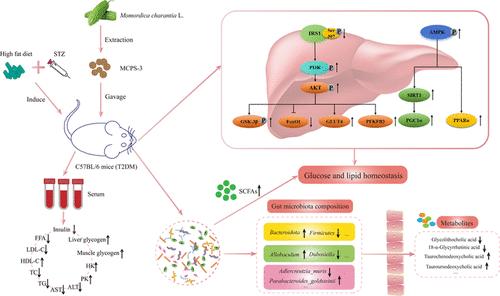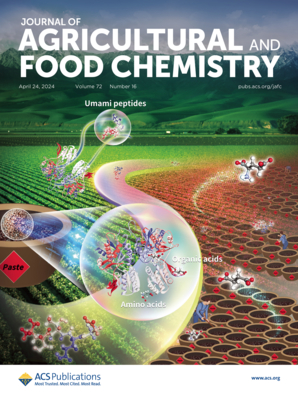苦瓜多糖通过激活IRS1/PI3K/Akt和AMPK信号通路及调节肠道菌群减轻小鼠2型糖尿病
IF 6.2
1区 农林科学
Q1 AGRICULTURE, MULTIDISCIPLINARY
引用次数: 0
摘要
开发有效的治疗2型糖尿病(T2DM)的方法仍然是全球卫生的一个关键优先事项。本研究探讨了从苦瓜中提取的多糖MCPS-3在高脂肪饮食和链脲霉素诱导的T2DM小鼠模型中的新型降糖潜力及其潜在机制。我们的研究结果表明,MCPS-3治疗显著降低了血清葡萄糖水平,改善了葡萄糖耐量,增强了胰岛素敏感性,同时增加了糖原储存和改善了肝酶活性。它还减轻了糖尿病引起的胰腺、肝脏和肾脏损伤,并通过降低甘油三酯和LDL-C而提高HDL-C水平来改善血清脂质谱。机制研究表明,MCPS-3激活了IRS1/PI3K/AKT和AMPK通路,对葡萄糖和脂质调节至关重要。重要的是,MCPS-3处理通过增加微生物多样性和改变有害和有益细菌的组成来恢复肠道微生物平衡。代谢组学分析进一步确定了46种代谢物的变化,暗示了与类固醇和脂质代谢相关的途径。这些发现强调了MCPS-3抗糖尿病作用的多面性,包括其作为肠道微生物群和代谢途径调节剂的作用,并支持其作为改善T2DM代谢健康的治疗药物的潜力。本文章由计算机程序翻译,如有差异,请以英文原文为准。

Polysaccharide from Momordica charantia L. Alleviates Type 2 Diabetes Mellitus in Mice by Activating the IRS1/PI3K/Akt and AMPK Signaling Pathways and Regulating the Gut Microbiota
Developing effective therapies for type 2 diabetes mellitus (T2DM) remains a critical global health priority. This study explored the novel antidiabetic potential of MCPS-3, a polysaccharide derived from Momordica charantia L., and its underlying mechanisms in a high-fat diet and streptozotocin-induced T2DM mouse model. Our results indicated that MCPS-3 treatment significantly reduced serum glucose levels, improved glucose tolerance, and enhanced insulin sensitivity, alongside increased glycogen storage and improved liver enzyme activities. It also alleviated diabetes-induced damage in the pancreas, liver, and kidneys and improved serum lipid profiles by lowering triglycerides and LDL-C while increasing HDL-C levels. Mechanistic studies revealed that MCPS-3 activated the IRS1/PI3K/AKT and AMPK pathways, essential for glucose and lipid regulation. Importantly, MCPS-3 treatment restored gut microbial balance by increasing microbial diversity and shifting the composition of harmful and beneficial bacteria. Metabolomic analysis further identified changes in 46 metabolites, implicating pathways related to steroid and lipid metabolism. These findings underscore the multifaceted nature of MCPS-3′s antidiabetic effects, including its role as a modulator of gut microbiota and metabolic pathways, and support its potential as a therapeutic agent for improving metabolic health in T2DM.
求助全文
通过发布文献求助,成功后即可免费获取论文全文。
去求助
来源期刊
CiteScore
9.90
自引率
8.20%
发文量
1375
审稿时长
2.3 months
期刊介绍:
The Journal of Agricultural and Food Chemistry publishes high-quality, cutting edge original research representing complete studies and research advances dealing with the chemistry and biochemistry of agriculture and food. The Journal also encourages papers with chemistry and/or biochemistry as a major component combined with biological/sensory/nutritional/toxicological evaluation related to agriculture and/or food.

 求助内容:
求助内容: 应助结果提醒方式:
应助结果提醒方式:


